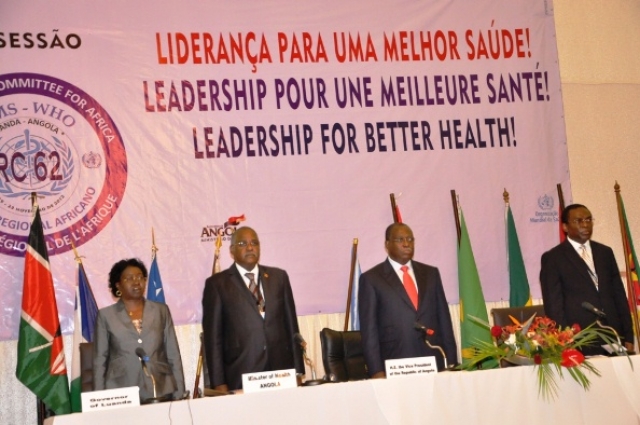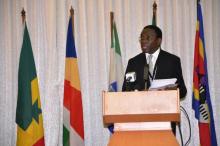The 62nd Session of WHO Regional Committee for Africa opens in Luanda, Angola
 Luanda, 19 November 2012 -- The Sixty-second session of the World Health Organization (WHO) Regional Committee for Africa was officially opened at the Talatona Hotel Conference Centre, Luanda, Angola by the Vice-President of Angola, His Excellency Manuel Vicente.
Luanda, 19 November 2012 -- The Sixty-second session of the World Health Organization (WHO) Regional Committee for Africa was officially opened at the Talatona Hotel Conference Centre, Luanda, Angola by the Vice-President of Angola, His Excellency Manuel Vicente.
The five day event has attracted over 350 delegates. Among those present at the opening were cabinet ministers of the Government of Angola; Ministers of health and heads of delegation of Member States of the WHO African Region; the WHO Regional Director for Africa, Dr Luis Gomes Sambo; representatives of the African Union Commission; members of the diplomatic corps; and representatives of United Nations agencies and nongovernmental organizations.
In his address to the Regional Committee, the Vice-President of Angola, His Excellency Manuel Vicente welcomed the delegates and noted that the meeting is taking place at time when health is recognized as vital to socio-economic development. He observed that the development of any inclusive, democratic, progressive, welfare society requires an efficient health system and that the Angolan authorities always place importance on public health care in national development policies.
Emphasizing on the expansion of peripheral health networks and specialized services, he said:” We need to persistently improve quality and ensure equity in universal access to integrated health services by all citizens, without exception, throughout their life cycle”. He added that health systems should be more solid and focused on enabling people to take preventive measures to avert the onset or worsening of illness and to adopt healthier lifestyles. It should also focus on prevention, diagnosis, treatment and in a holistic manner to meet the people´s expectations and preferences.
The Vice-President highlighted efforts made by the Angolan government in this regard and stressed that financial resources are being allocated to provide primary health care at the municipal level. Regarding the need for qualified human resources for health, he said that, the Angolan government has a national plan for 2013-2020 to fill this gap which would allow the country to face the current insufficiency of only 2 medical doctors per 10 000 inhabitants.
Vice-President Vicente pointed out that collaboration between different sectors including education, energy, sanitation, food security and others is vital to reduce maternal and child mortality, prevent and control communicable and noncommunicable diseases and disease outbreaks. He referred to ongoing collaboration among various sectors and development partners in Angola which is contributing to eradicating polio in the country. He reminded delegates that in recognition of the importance of an effective response to public health emergencies, the Angolan authorities have made a contribution to the African Public Health Emergency Fund.
Addressing the delegates on behalf of the WHO Director-General, Dr Margaret Chan, the WHO Regional Director for Africa, Dr Luis Gomes Sambo, expressed his gratitude on behalf of Member States and representatives to the President, the Government and the people of Angola for the hospitality and arrangements made for the Regional Committee. He gave an overview of the health situation in the Region, observing that countries have achieved progress in health over the last decades and this trend would continue with a focus on primary health care – (an approach where essential health care; based on practical, scientifically sound, and socially acceptable methods and technologies are made accessible to everyone through their full participation and at an affordable cost).
He said: “The primary health care approach has been a true public health revolution, allowing greater community participation, training and allocation of human resources and the improving of the access to health technologies, as well as essential drugs and vaccines”.
Dr Sambo drew attention to new opportunities for successful health reforms given the economic growth in Africa and the need to account for the opinions and expectations of communities and grassroots organizations in decision-making as well as strengthening inter-sectoral dialogue, through the leadership of health ministers.
The Regional Director highlighted progress on making available vaccine, to protect about 500 million people exposed to meningitis epidemics in the Sahel, providing access to antiretroviral drugs for 6.1 million HIV/Aids infected people and reduction of the number of polio cases by 66%. He proposed the creation of an African Medicines Agency to strengthen the pharmaceutical industry in Africa. He said, in spite of these, HIV/AIDS, tuberculosis, malaria, some recurrent epidemics and maternal and child mortality continue to be issues of public health and development concern.
He expressed his hope that the meeting will provide concrete recommendations and action plans, that will contribute to improving people´s health in the African region.
Among the issues on the agenda are, HIV prevention and treatment, health promotion, health and human rights, WHO 12th General Programme of Work - (the plan of work of WHO for the next two years); WHO’s proposed Programme Budget for the 2014 – 2015 biennium; a road map for scaling up the health workforce in the Region for improved health services delivery; the implementation of the International Health Regulations in the African Region; the strengthening of national health information systems, and the optimization of existing global health initiatives to strengthen national health systems in the African Region. A panel discussion on Traditional Medicine and side events on new vaccines, HIV/AIDS, tuberculosis, malaria and partnerships for health are expected to take place.
The WHO African Region comprises 46 countries and the Regional Committee is one of the Organization´s governing bodies that reviews WHO's work in the Region and give directions on actions to improve the health situation in Member States.
_______________________________________________________________________
For more information, please contact:
Communication, Advocacy and Media Unit: cam [at] afro.who.int Tel: 004724139420 / 00472 4139378
C. Boakye-Agyemang Boakyec [at] afro.who.int Tel 00 244 943801810
José Caetano caetanoj [at] ao.afro.who.int Tel 00244 926546698
Joana Teixeira Teixeiraj [at] afro.who.int



